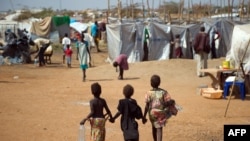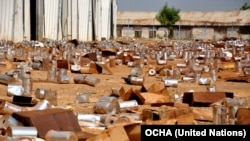JUBA —
United Nations emergency response officials called on the warring sides in South Sudan to stop fighting to alleviate the suffering of the country's people, who are facing extreme hardship as unrest goes into a fourth month and the rainy season looms.
"We appeal to everybody, at every level, with any influence, with any authority, with any capacity, to help to bring this conflict to an end," John Ging, who oversees field operations around the world for the U.N. Office of Humanitarian Affairs (OCHA), told a news conference in Juba.
Ging was part of a team from eight humanitarian agencies -- OCHA, the UN refugee and children's agencies, the Food and Agriculture Organization, World Food Program, World Health Organization, Danish Refugee Council, and International Organization for Migration -- who wrapped up a three-day visit to South Sudan Friday, during which they traveled around the country to assess the needs of hundreds of thousands of displaced people.
Ging said he saw displaced people, mostly women and children, who are going without food in U.N. protection sites and camps under government and rebel control. He called on all parties to the conflict to do something to stop the suffering.
"The people of this country truly deserve a future which is peaceful; a future in which they can build the potential of this country," Ging said.
He warned government and opposition forces to stop looting humanitarian organizations' warehouses and offices, saying it made it more difficult to convince international donors to help South Sudan if they think the aid they give will end up in the hands of looters.
"We are only here to help the people of this country. We cannot raise money internationally for humanitarian action if every time the humanitarian supplies are stolen, the humanitarian vehicles are robbed and so on," he said.
Aid agencies including the World Food Program (WFP) and Doctors Without Borders (MSF) have reported that their offices, hospitals and warehouses have been looted during the fighting in the country.
David Kaatrud of WFP said some aid has been held up at checkpoints that have been set up along roads leading to Jonglei and Unity states, two of the states most heavily impacted by the fighting and the resulting humanitarian crisis.
At least 50 trucks carrying food and supplies are stranded on the roads after being stopped at the checkpoints, which are manned by government forces, he said.
Lives could be saved and suffering alleviated if the trucks were checked quickly and allowed to continue on their way, he said.
Toby Lanzer, OCHA's coordinator for South Sudan, warned that even civilians who have been given shelter from the fighting on U.N. bases face hunger and serious threats to their health.
Early rains that pummeled Juba last week destroyed hundreds of makeshift shelters in one U.N. base in Juba where thousands have sought refuge.
"Here in Juba, you have seen the water, the stagnant water which has health implications. You have seen the situation of the children. So, we are really in a crunch 30-day period now," before the rainy season begins in earnest, Lanzer said.
Once the rains begin, parts of the country become completely inaccessible by road and some of the low-lying areas where IDPs have sought shelter, including U.N. bases in Juba, are likely to be flooded.
The U.N. Mission in South Sudan (UNMISS) is working with the government and Chinese donors to build a third camp for the displaced in Juba.
The new camp, which is expected to be ready by mid-April, will provide better shelter, drainage, sewage structures and other infrastructure than are available on UNMISS bases, where almost 30,000 people have sought refuge since fighting broke out more than three months ago.
"We appeal to everybody, at every level, with any influence, with any authority, with any capacity, to help to bring this conflict to an end," John Ging, who oversees field operations around the world for the U.N. Office of Humanitarian Affairs (OCHA), told a news conference in Juba.
Ging was part of a team from eight humanitarian agencies -- OCHA, the UN refugee and children's agencies, the Food and Agriculture Organization, World Food Program, World Health Organization, Danish Refugee Council, and International Organization for Migration -- who wrapped up a three-day visit to South Sudan Friday, during which they traveled around the country to assess the needs of hundreds of thousands of displaced people.
After an hour on a make-shift canoe, we reached an island where 2,000 civilians were sheltering under trees. pic.twitter.com/FMU72tFbrV
— Toby Lanzer (@tobylanzer) March 21, 2014
Ging said he saw displaced people, mostly women and children, who are going without food in U.N. protection sites and camps under government and rebel control. He called on all parties to the conflict to do something to stop the suffering.
"The people of this country truly deserve a future which is peaceful; a future in which they can build the potential of this country," Ging said.
He warned government and opposition forces to stop looting humanitarian organizations' warehouses and offices, saying it made it more difficult to convince international donors to help South Sudan if they think the aid they give will end up in the hands of looters.
"We are only here to help the people of this country. We cannot raise money internationally for humanitarian action if every time the humanitarian supplies are stolen, the humanitarian vehicles are robbed and so on," he said.
Aid agencies including the World Food Program (WFP) and Doctors Without Borders (MSF) have reported that their offices, hospitals and warehouses have been looted during the fighting in the country.
David Kaatrud of WFP said some aid has been held up at checkpoints that have been set up along roads leading to Jonglei and Unity states, two of the states most heavily impacted by the fighting and the resulting humanitarian crisis.
At least 50 trucks carrying food and supplies are stranded on the roads after being stopped at the checkpoints, which are manned by government forces, he said.
Lives could be saved and suffering alleviated if the trucks were checked quickly and allowed to continue on their way, he said.
Toby Lanzer, OCHA's coordinator for South Sudan, warned that even civilians who have been given shelter from the fighting on U.N. bases face hunger and serious threats to their health.
Early rains that pummeled Juba last week destroyed hundreds of makeshift shelters in one U.N. base in Juba where thousands have sought refuge.
"Here in Juba, you have seen the water, the stagnant water which has health implications. You have seen the situation of the children. So, we are really in a crunch 30-day period now," before the rainy season begins in earnest, Lanzer said.
This shelter is dry for now but not for long. Families will have to move to #UNHouse which lies on higher land. pic.twitter.com/rLBmIcSQBI
— Toby Lanzer (@tobylanzer) March 13, 2014
Once the rains begin, parts of the country become completely inaccessible by road and some of the low-lying areas where IDPs have sought shelter, including U.N. bases in Juba, are likely to be flooded.
The U.N. Mission in South Sudan (UNMISS) is working with the government and Chinese donors to build a third camp for the displaced in Juba.
The new camp, which is expected to be ready by mid-April, will provide better shelter, drainage, sewage structures and other infrastructure than are available on UNMISS bases, where almost 30,000 people have sought refuge since fighting broke out more than three months ago.





